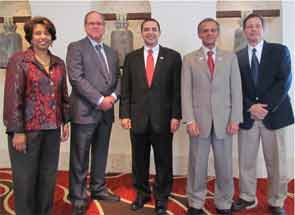
Ask Your Members of Congress to Cosponsor These Bills
The larger the number of legislators cosponsoring these bills, the more likely they are to move forward in Congress. Are your members of Congress supporting the issues that will help you and your patients?
- H.R. 460—Patients’ Access to Treatments Act
- H.R. 1416—Protect Patient Access to In-Office Treatments
- H.R. 1701—Cutting Costly Codes Act
The ACR government affairs staff is here to answer your specific questions about these topics so you are ready to meet with your members of Congress. Give them a call at (404) 633-3777 or send an e-mail to [email protected].
Members of Congress will spend the month of August working in their districts and meeting with constituents. As they hear about myriad issues affecting your friends and neighbors, it is critical that they also hear from you. Speak up for rheumatology and help educate lawmakers on the critical issues facing our community.
August recess lasts all month, and lawmakers’ schedules will fill up quickly. Plan ahead and request an August meeting in July to ensure you have a spot. In-person meetings are critical because they allow you to develop a personal relationship with your lawmakers and their staff. As you continue to grow this relationship, lawmakers will feel comfortable turning to you as a trusted resource on important healthcare issues.
How Do I Schedule a Meeting in the Local Office?
Use the Legislative Action Center on the ACR website to find your legislator’s contact information. When you call your lawmakers’ local office, a member of their staff will answer the phone. Identify yourself as a constituent and tell them that you would like to meet with the representative during August recess to discuss current legislative issues that affect your practice and your patients. The staff member will find a mutually convenient time for you to stop by.
What Issues Do I Discuss?
Below are three of the major legislative priorities on which ACR members are focusing. Collectively focusing on these priorities presents a united front.
H.R. 460—Patients’ Access to Treatments Act: Biologic drugs like those used to treat rheumatoid arthritis, psoriatic arthritis, lupus, and other rheumatic diseases are breakthrough treatments that can prevent disability, save and improve lives, and allow patients to function and remain in the workforce. Insurance plans are increasingly placing biologic drugs on specialty tiers, often Tier IV, requiring patients to pay a percentage of the drug cost instead of a flat copay. This leaves many patients unable to access these critical medications. H.R. 460, Introduced by Rep. David McKinley (R-WV) and Rep. Lois Capps (D-CA), would limit cost sharing on specialty tiers to what plans require for nonpreferred brand drugs. Ask members of Congress to cosponsor H.R. 460.
H.R. 1416—Protect Patient Access to In-Office Treatments: Sequestration cuts to Medicare payments went into effect April 1. The reductions are affecting reimbursement both for services and infusion drugs, effectively decreasing Part B drug reimbursement from average sales price (ASP) plus 6% to ASP plus 4%. These cuts threaten the ability of rheumatologists to provide critical therapies to patients. Patients may be forced to seek treatment in the hospital setting, which translates to a higher cost to patients and the system, and often significant additional burdens. Rep. Renee Ellmers (R-NC) introduced H.R. 1416, which would exempt physician-administered drugs under Medicare Part B from sequestration. Ask members of Congress to cosponsor H.R. 1416.
H.R. 1701—Cutting Costly Codes Act: Healthcare providers use the International Classification of Diseases (ICD) to make diagnoses and record statistics. In the United States, providers currently use ICD-9, which includes 13,000 codes. If ICD-10 is implemented as scheduled on October 1, 2014, the number of codes will increase to 68,000. In rheumatology, like many other specialties, the effects of this change would be overwhelming. For example, ICD-9 has one code for rheumatoid arthritis—the most common disease rheumatologists treat—but ICD-10 includes 78 possible codes for rheumatoid arthritis. Adapting to this level of complexity will require significant training for physicians and staff. In addition to this administrative burden, the change will be expensive, costing a small practice up to $83,000. H.R. 1701, introduced by Rep. Ted Poe (R-TX), and S. 972, introduced by Sen. Tom Coburn (R-OK), would prohibit HHS from replacing ICD-9 with ICD-10. It would also require a study on mitigating the disruption to healthcare providers resulting from replacing ICD-9. The ACR advocates for skipping ICD-10 altogether and instead moving forward with ICD-11 when it is ready. Ask your representative to cosponsor H.R. 1701 and ask your senators to cosponsor S. 972.
What Other Opportunities Are There to Meet with My Lawmaker?
Providing lawmakers the opportunity to see your office, and meet your staff and patients, can powerfully illustrate your message and strengthen your relationship. Invite your lawmakers to visit you in your practice, where you can show them how the decisions they make in Washington affect the care you provide. This is also a ready-made event for photo opportunities, and your member of Congress often will be eager to share the story of his or her visit with other constituents and the media.
Many lawmakers also hold town halls or informal meet-and-greets. Call the nearest district office to inquire about any upcoming events.
Remember to take photos and let the ACR know about your meeting. If you met with your lawmaker, we would like to hear about it! Send us your photos and stories, and you may see yourself highlighted on our website or in upcoming ACR publications.
We’re Here to Help!
For help scheduling or preparing for a meeting with your members of Congress, contact the ACR government affairs staff at (404) 633-3777 or [email protected].
